Age of Mythology: The Titans Gaia Showcase
We take an in-depth look at all that Gaia has to offer in the upcoming Age of Mythology expansion pack.
In Ensemble Studios' 2002 real-time strategy game Age of Mythology, three distinct cultures waged war against each other: the Egyptians, Greeks, and Norse. They fought not only with mortal troops, but with the aid and support of their gods, in the form of mythological units and fantastic god powers. But in the upcoming expansion pack, called the Titans, this three-way war is welcoming a new faction: the Atlanteans. And this powerful new faction has the power of a new pantheon of deities, a race of gods for whom the expansion pack is aptly named: the mighty Titans of Greek myth. In this first of three previews on the upcoming expansion, we'll reveal the unique abilities of the Atlanteans and preview one of their major gods.
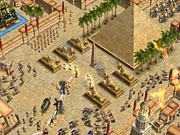
Bruce Shelley, one of the creative minds behind the Age series, says there were many reasons why the Atlanteans were chosen as the fourth faction for Age of Mythology. Says Shelley, "We chose to center the Age of Mythology expansion around Atlantean mythology for several reasons, but mainly because the team thought it would be the most interesting subject from which to create a game. The Atlanteans also tie in to our single-player game very well. The Atlantean mythology is basically the precursor to the Greek mythology of [the original game], but it has been generously expanded and embellished by modern writers, with the result that it creates a lot of opportunity for creative game developers."
The Titans of ancient Greek mythology were the powerful forebears of the gods. When their leader, Kronos, was defeated by Zeus, their dominion over the world passed to the Olympian gods. Shelley says, "When the Atlanteans were sketched out as a possible new mythology we decided that their gods would be the Titans, the first generation of gods in the Greek mythology and the parents of Zeus, Poseidon, Hades, and the other gods of Olympus. First among the Titans for consideration as a major god in our game was Gaia, the earth mother. She precedes all the other gods and creates the ancient world, beginning by creating Oranos, the sky, and mating with him. Their progeny are the 12 Titans. Together they create the oceans, mountains, farmlands, and creatures, including humans."
In the single-player campaign, you will get to see the Titans seek revenge against the Greek gods for supplanting them. In Greek mythology, Kronos dethroned his father and mother, Oranos and Gaia, to rule the Titans. But Zeus, child of Kronos, eventually attacked and usurped his father's throne, as his father had done before him. Imprisoned for eons, Kronos now is being worshipped by the recently raised Atlanteans and has the opportunity to repay Zeus and the Greeks for his suffering. But Gaia, the mother of the earth, might not necessarily share Kronos' thirst for revenge. We don't want to give away any details of the campaign, but despite the fact that both Kronos and Gaia are considered Titans, they don't always see eye to eye. Ensemble is creating a lot of unique art and even new units and Titans for the single-player campaign, so you can expect to see some surprises you might not see in multiplayer or random games. The expansion's single-player campaign is an extension of the original game's campaign. In the first campaign, Atlantis rose up from the sea, and so the expansion's campaign reveals what happens after this event. The campaign takes place years after the original one and revisits some familiar characters, such as Caster, who is now all grown up and ready to take charge.

Of course, the campaign should be kept relatively vague so as not to ruin it for you when the game ships later in the year. What we can reveal, though, are the many new gameplay features you'll encounter when you finally get to play the expansion. We'll get to the first major Atlantean god, Gaia, shortly, but let's first see what makes this expansion pack unique. Two things jump out at you immediately: the in-game titans and the Atlanteans.
The title "Titans" refers not to the new gods, but to the titans you can build and control in the game. Each culture can now build an ultimate unit, a massive brute with thousands of hit points that is also extremely expensive, with prices approximating a wonder. But when they are finished, they are nearly impossible to destroy without a titan of your own. You can build only one, but one is pretty much all you need. Each culture has a unique titan. The Atlantean titan looks like a giant humanoid made of rock and lava, while the Greek titan is a huge man with three dog heads resembling the guardian of the Underworld, Cerberus. The Egyptians have a hawk-headed man, while the Norse have a mammoth troll wielding an icy hammer.
Atlantis Rising
With the Atlanteans as the fourth race, Ensemble Studios had an opportunity to be really creative with the design of the new culture. Because Atlantis has no true historical basis, there aren't any references that the designers were forced to follow. Everything from the language they spoke to the look of their units had to be created from the ground up. According to music and sound director Stephen Rippy and music and sound artist Kevin McMullan, the question they faced in developing the new race was simply, "What are we going to have them speak?" Because in Age of Mythology Atlantis is set up as a prototype of the three original cultures, these two decided that the Atlantean language should sound like the precursor for Egyptian, Norse, and Greek. Hence, they took bits from all three languages to create a unique dialect for them.
The same can be said for the art for the Atlanteans. Art producer Lance Hoke says, "We wanted to have an aquatic feel, but we didn't want to go overboard with seashells and sea horse mounts." So, many Atlantean units have scales on their armor to evoke images of scaled fish and some oceanic flourishes on their gear, such as artistic waves. But that's it for the sea visuals. Hoke also wanted to call attention to the opulent lifestyle of the Atlanteans, so many of their units have heavy, flowing capes. All of Ensemble echoes Hoke's words when he says, "We had a lot more freedom with the design since we weren't restricted by any references."
Although the look and sound of the Atlanteans are new, it's their unique gameplay that really sets them apart from their Age of Mythology counterparts. If you have trouble playing as the other cultures because the game is too fast for you, then the Atlanteans are an ideal race for you.
Atlantean resource gathering and scouting are somewhat different. Each Atlantean citizen counts as three citizens for purposes of population, cost, and resource gathering. Atlantis' citizens are very expensive, but they gather nearly three times more resources than the other factions' citizens. Moreover, they don't need to drop off their resources at a town center or lumber camp, similar to the peasants in Rise of Nations--all you need to do is click on a resource patch and forget about that citizen. And because they don't need to drop off their harvest, they gather faster. Also, they don't need to wait an extra few seconds to set up a camp first. You just set your citizen to the resource spot and move on. Playing as Atlantis, you'll notice that you'll get a lot more resources for a lot less micromanagement. Another benefit of the Atlantean citizens is that they can build a farm anywhere you want them to, instead of around a granary as with the other cultures. But their advantages are balanced out by their increased cost and the fact that each one counts as three people against your population limit.
The scout unit for Atlantis is the oracle. However, unlike with traditional scouts, you won't want to send it around the map using waypoints. That's because the oracle has an exceedingly small line of sight when moving. But when it stays in one place, its sight radius slowly expands until it can see across more than a screen's length. That means you'll want to set them up at a designated spot, wait for them to reveal a large area of the map, and then repeat the step. They are built at the temple, although you also start the game with a few. They have no attack.

The building tree of the Atlanteans is also a little different from other cultures. Ensemble was noticing that players were already dividing units more into two groups--regular units and counter units--rather than by unit types, like archers, infantry, and so on. So the team decided to just make that distinction even clearer, which should benefit new players. Now, most Atlantean mortal units are built either at the military barracks or the counter, or specialist, barracks. At the specialist barracks, you'll be able to build your counter cavalry, the katapeltes, as well as your counter archer and counter infantry units.
These changes to basic gameplay are already quite radical, but there are more. Atlanteans also gather divine favor a little differently. They constantly receive a slow trickle, which increases with each town center you have under your control. So Atlanteans really need to expand quickly to ensure a faster flow of favor. To help them in this regard, they can build town centers starting in the first age, one age earlier than any other culture. So they really can expand rapidly, since they have the best means out of any cultures to do so. And considering their versatile citizens, the Atlanteans seem like a truly expansionist power.
More Changes
The other abilities of the Atlanteans are slightly different housing and a big boost to their god powers. Atlanteans build manors instead of houses. These manors increase your population cap by 20 instead of by 10, so an Atlantis player only needs a maximum of five of them. This, coupled with their less numerous but more efficient citizens, actually seems to indicate that the Atlantean economy could be much more vulnerable to attack than other civs.
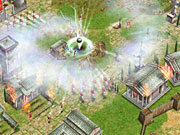
This change is slight however, compared to what should prove to be a very popular Atlantean asset: multiple-use god powers. Some truly powerful god powers may still be used only once, but others can be used two, three, or even four times. The way Ensemble balanced these powers' usage was by adding very long cooldown periods between castings. The typical wait might be from five to 20 minutes, or even longer, so you won't be able to throw down three quick attacks in succession--imagine three earthquakes at once, for instance. Designer Ian Fischer pushed hard to make sure that Atlantean god powers didn't suffer just because they could be used more than once. So rather than limit them in effectiveness, they implemented the cooldown times to balance them. And some Atlantean god powers are still so powerful that they warrant only one use.
Yet all these Atlantean bonuses won't make them an overpowered race. Ensemble not only balanced the powers of Atlantis, but also went back to the original game to tweak and rebalance the rest of the game. All god powers were reexamined. Ensemble looked at some that weren't that effective or often used, such as eclipse, and beefed them up. In the case of the eclipse power, its effect is being drastically increased so that myth units move even faster, and the recharge rate for their special attacks is even quicker, to the point where, for example, medusas can turn their enemies to stone in rapid succession. This is but one of many powers that have been examined closely by the design team. Others that will be improved are cease-fire, healing springs, and locust swarm powers. The improvements are an effort to make the god powers more equitable, especially considering that the Atlantis gods can use theirs more than once in many cases. Again, part of balancing out this ability was making sure every god power was now really useful.
Ensemble also wanted to make myth units an even bigger part of the game. So the designers went back and looked at all the mythological units. They decided that people weren't using them enough and that they were getting wiped out by heroes. So, now, when you advance to a new age, you will automatically get a myth unit at your temple. The unit will be appropriate for the age to which you have just advanced. So if you reach the classical age as the Greeks and chose Ares as your patron god, a Cyclops will appear automatically at your temple, for free. And if your minor god has both a land and sea myth unit, you'll get both, provided you have a dock built already. Myth units themselves are also being enhanced. Across the board they will be cheaper in terms of both resources and favor, and many are being boosted in stats such as hit points and attack. This will make them tougher against heroes, although heroes will still be myth unit killers.
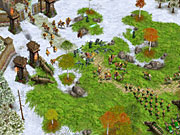
The original factions are also being rebalanced in the expansion, especially so that they can effectively challenge the Atlanteans. Greek heroes, for example, because of their limited numbers, would be overwhelmed by more myth units, so the Greeks will be getting new technologies that will give their specialty units a little more firepower against mythology creatures. The Norse, who have no archers, would be at a severe disadvantage against the several flying units the Atlanteans get, so the Norse get a new mythological technology that gives their throwing axmen a slight damage bonus against air units.
Some of the rebalancing is being done because certain units seem underutilized, for whatever reasons. Ensemble is looking at them and either changing the units so they become more desirable to use or changing the situation that prevents the unit from being used. For example, some specialty Greek units can be built only at the fortress, but with the all-important siege weapons also being built there, few Greek players were training them. By now moving those units to the academy in the expansion, Ensemble is hoping that more players will go ahead and train those specialty units, since you will no longer give up valuable access to a siege engine by building that unit.
While we didn't get a chance to see all the details on every old unit, technology, or god power, Ensemble did say that everything was being examined to make sure everything in the game is exciting to use.
Gaia's Powers
The solo campaign showcases the differences between the Titans, which are based on their depictions in classic Greek mythology. While Kronos is a cruel god, Gaia is a nurturing presence who promotes life and prosperity. This profile translates well to her theme in the Age of Mythology expansion pack.
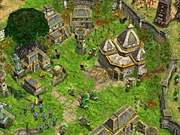
Shelley reveals, "Since Gaia was such a creator and nurturer of life, it was natural that she would be an economy-oriented major god. Each of the Atlantean major gods have one important and unique attribute, and for Gaia this is 'lush' terrain. When players worshipping Gaia create buildings, new vegetation called 'lush' begins to spread from the buildings. Enemy players cannot construct buildings on lush, so it provides a defensive barrier against forward building tactics (such as sneaking in citizens to build defensive structures near enemy territory). When Gaia buildings are destroyed, lush gradually recedes." Smaller buildings, such as barracks, will generate less lush than larger ones, such as a town center. Lush does have one other benefit: Buildings on it slowly regenerate if damaged. It's thus a little more difficult to wipe out a Gaia player, as her buildings will recover if you don't finish the job, and you can't leave towers behind in her city to finish her off.
Ensemble really wanted to make the differences between the gods even more noticeable and so decided to give the three Atlantean gods more tangible bonuses than just cheaper technology or stronger units. Also, these tangible bonuses are tied very closely to each god's divine portfolio, like the lush for Gaia. But it isn't her only distinguishing ability, as pointed out by Shelley: "Gaia has several other bonuses, as well. All Gaia buildings regenerate. If they take damage but are not destroyed, they will eventually repair themselves to full strength. Economic improvements for increasing the gathering rates of food, wood, and gold are less expensive for Gaia. Gaia fishing ships and caravans are cheaper to build and take more hits [to destroy] than [those of] other gods."
Gaia's god power naturally fits in well with her position as the earth goddess, but it also has defensive applications in addition to its obvious economic boost. Says Shelley, "Gaia's god power is Gaia's forest. When this is called down upon an open area, a forest of trees shoots upward from the ground. These trees have two main uses. First, they can act as a barrier or wall because units cannot pass through them. Second, the trees are a source of wood that can be harvested. Villagers can gather more wood and gather faster from Gaia's forest. This is especially useful on maps where wood is scarce or in games with lots of water where wood will be a critical resource." But Gaea players should be careful, since other players' villagers can also gather wood from Gaia's more bountiful forest. Still, you can place one down at your starting town center at the beginning of the game and start raking in the wood much faster than any other player. And don't think this is a waste of your god power. You can use Gaia's forest again for defense or more wood if you need it later. That's right; you can use Gaia's god power more than once. It's another one of the Atlanteans' many unique abilities that set them apart from the original three cultures.
Not forgetting that Atlantean theme, Ensemble based Gaia's mythological improvement on pseudo-historical accounts of commerce in Atlantis. Shelley points out, "Gaia's mythological improvement is the channels ability, which allows villagers to move faster. In Plato's account of Atlantis, he mentions extensive canals on the island that sped the movement of resources."
But as all Age of Mythology players know by now, your choice of major god also dictates what options you'll have as you advance through the ages. So let's take a look at the minor gods that can support Gaia.
Minor Gods
The first fork in the road to age advancement leads Gaia to choose between two minor gods, Leto and Oceanus. Says Shelley, "Oceanus was the personification of a great river that flowed around the earth, and his children [were] all lakes, streams, and ponds. Choosing Oceanus also gives you access to the servant, a swimming myth unit that can heal ships, and the caladria, a flying myth unit that heals human units. Both of these units will automatically heal eligible units within line of sight that are not fighting. You must actively target fighting units to be healed. The servant may attack enemy units, but the caladria has no attack. The caladria can be a useful flying scout, however. Oceanus's mythological improvements strengthen the murillo (infantry) and the katapeltes (infantry unit good against cavalry)."
Shelley has this to say about your second choice: "Leto was a daughter of Titans and she was often associated with the moon, with the power of invisibility (since, on the night of a new moon, the moon 'hides' itself), and with hidden animals. Her god power is the spider's lair, a clutch of giant spider eggs. The spiders are vulnerable in egg form, but once hatched they quickly bury themselves and then become invisible to enemies. When an unsuspecting enemy human soldier passes by, the spider reaches out of his lair and drags the soldier underground to his death. The spiders do not grab heroes, myth units, or villagers."
The myth unit for Leto is a formidable and cheap one. It's like a self-repairing, very strong robot, but one with a small favor cost. "Choosing Leto," says Shelley, "gives you access to the automaton, a metal man that has the special property of being able to repair itself after battle. Surviving automatons may also rebuild other automatons that were destroyed in battle, if rebuilding takes place fairly quickly. For this reason, it seems recommendable to keep automatons together and in sizable numbers (four or more) to take advantage of their special abilities. Leto also gives access to mythological improvements that make automatons less susceptible to pierce damage (arrows) and gives them more hit points."
Referring to the third age, Shelley says, "Going to the heroic age, Gaia allows you to choose between Rheia and Theia, two of the female Titans. Rheia was the mother of Zeus, but she had a falling out with him over her share of the universe after the Titans were overthrown. She retreated to the mountains where she is most often associated with wild animals, particularly lions."
Theia is your other choice of Titan in the heroic age. As Shelley states, "Theia was another Titan, and her children included Helios (the sun), Selene (the moon), and Eos (the dawn). Because of her association with light, she was also thought to have given the luster to gold, silver, and gems. Choosing Theia gives you access to the Hesperides god power, a giant tree that can be placed on the map and from which you train dryad myth units. The dryads are walking trees that can attack. The Hesperides also gives you protection from god powers within a radius of the tree. Control of the Hesperides can switch to an enemy player who moves units closer to it than you." Like with Hades' gold vault, you'll want to guard this god power-created building vigilantly. But unlike with the vault, you can use it two times, building two trees. However, your total number of dryads will be the same whether you have one or two trees, and at this point, Ensemble is considering keeping the maximum number of dryads you can control to about five or so. You won't be able to win the game with these dryads, but they will give you some extra muscle. One good thing about the tree is that you can build it anywhere you have line of sight, even behind enemy lines.
Theia's myth unit is the stymphalian bird, a flying myth unit that has a ranged attack. Their wings give them incredible mobility, meaning they can fly to the back of enemy bases and pick off villagers, disrupt economies, and harass undefended areas. To make matters worse for your enemy, they can only be attacked by ranged units. So if the enemy didn't plan to have lots of archers or towers, these birds would make quick work of them. Shelley also reveals Theia's myth technologies: "Mythological improvements accessed through Theia are the lemurian descendants (which increase line of sight for all soldiers), Poseidon's secret (secrets stolen from Poseidon give your cavalry more speed and attack), and the lance of stone (which improves the overall attack of contarius heroes, especially against buildings--contarius heroes are normal cavalry units upgraded to heroes)."
Shelley says, "Entering the mythic age you may choose between Atlas and Hekate. Atlas was the son of a Titan who fought against Zeus in the Titanomachy. He was condemned by Zeus to support the heavens on his shoulders and is usually portrayed as supporting a globe. The daughter of Titans, Hekate was the goddess of the night, ghosts, and magic. Her god power is the tartarian gate." Atlas has an awesome god power and a strong myth unit. Meanwhile, Hekate provides what some at Ensemble think could be the strongest myth unit in the game, the lampades.
We'll have to wait until next time to cover them in greater depth, when we unveil Kronos, the Titan god of time and the enemy of Zeus.
Got a news tip or want to contact us directly? Email news@gamespot.com
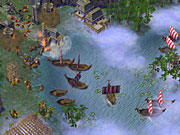
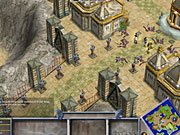

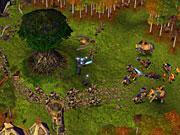
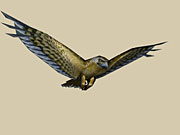
Join the conversation